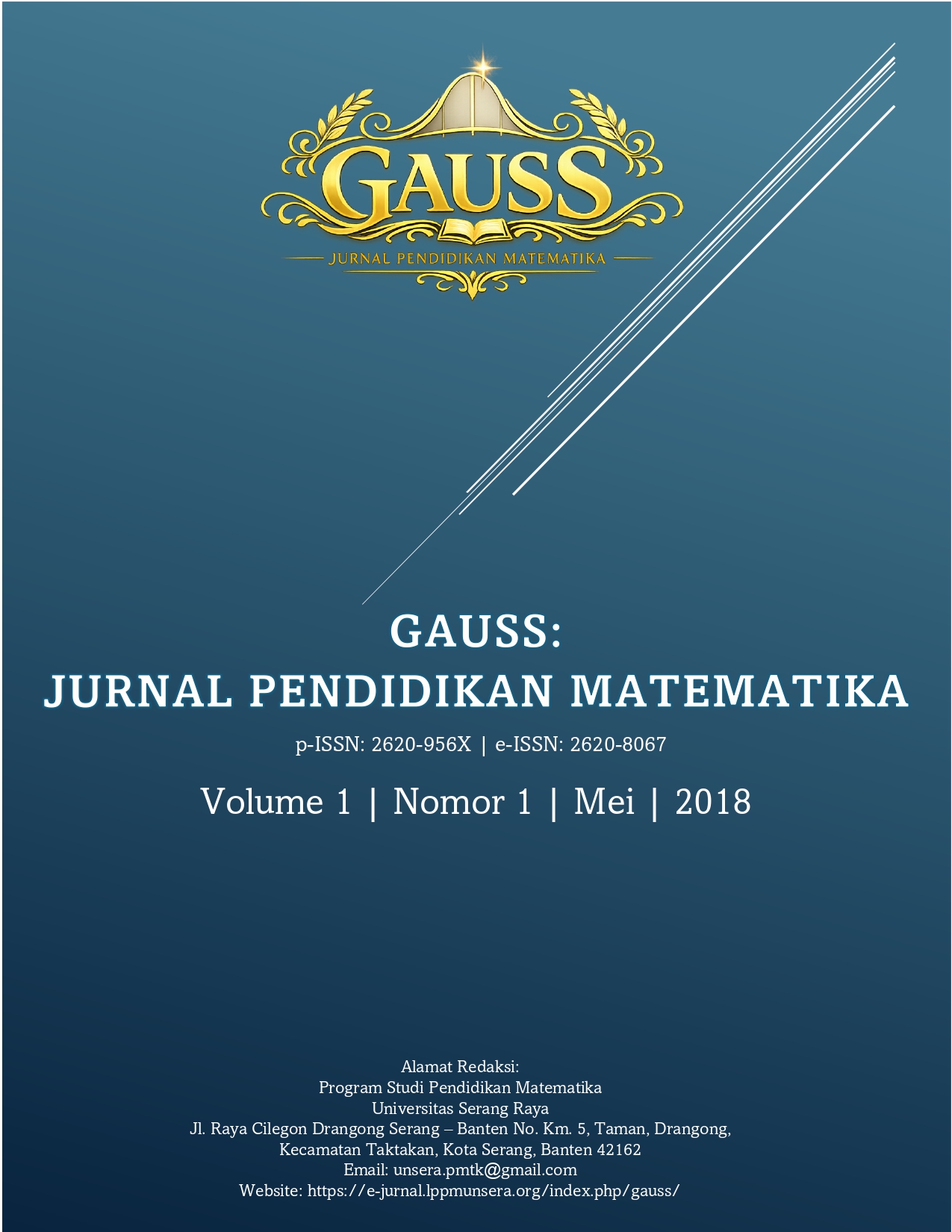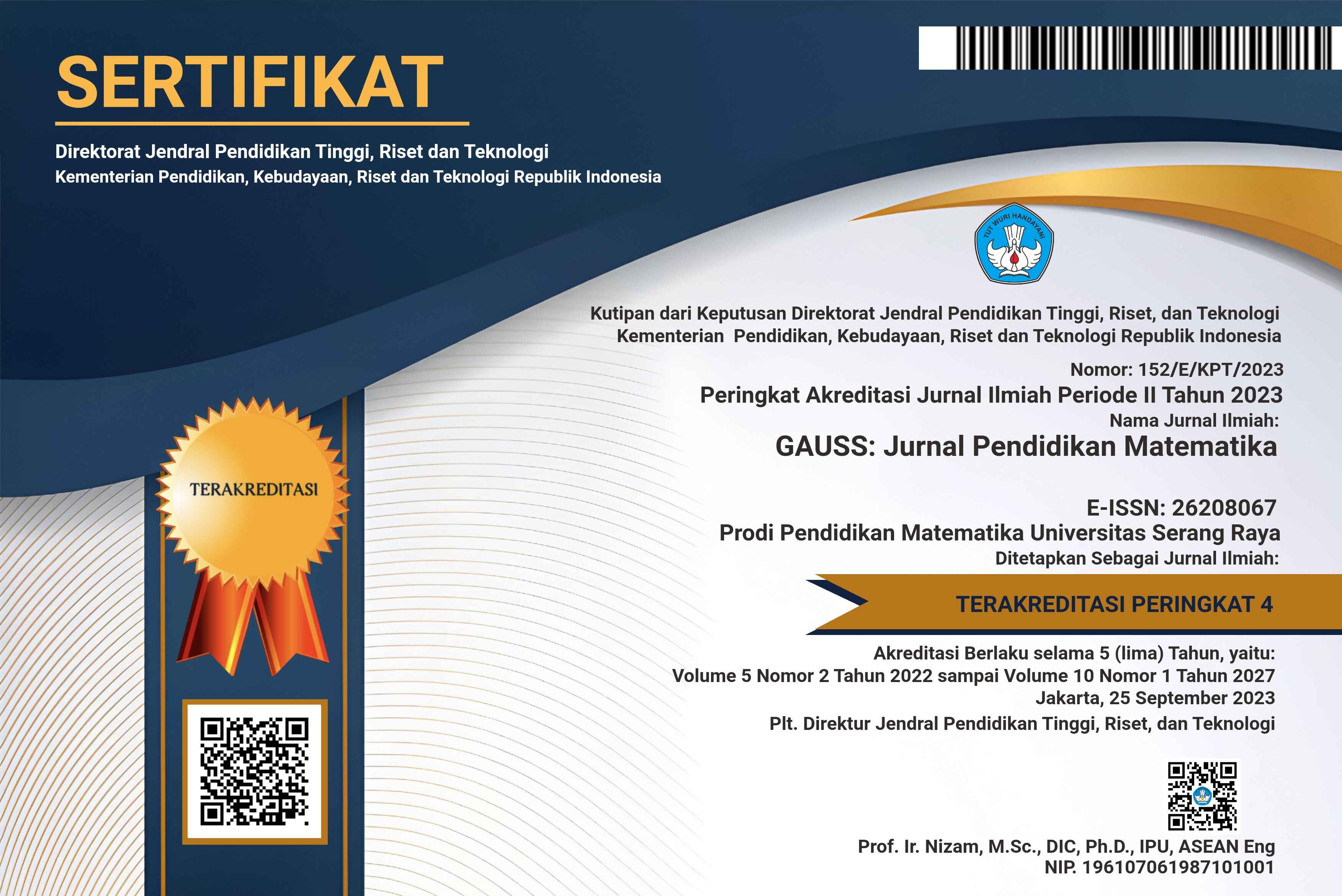Pengaruh Model Pembelajaran Kooperatif Student Teams Achievment Devision (STAD) dan Rasa Percaya Diri Siswa terhadap Hasil Belajar Matematika Siswa SMA
DOI:
https://doi.org/10.30656/gauss.v1i1.635Keywords:
Learning Model, Self-Confidence, Mathematics Learning OutcomesAbstract
This study aims to determine the effect of learning model on the mathematics learning outcomes of the students, knowing the influence of students' self-confidence in the results of learning mathematics. Furthermore, to determine the effect of learning models and students' self-confidence altogether to the result of learning mathematics. The research used is experimental method. The samples used from the affordable population taken from 34 people as the sample of the test instrument, and 68 people as the research sample using proportional random sampling technique from all grade X on SMA Negeri 3 Kabupaten Tangerang. The data were collected by giving the result of learning tests and questionnaires. The data analysis consists of testing the research instrument of validity, reliability, difficulty index, and distinguishing power*. Furthermore, there are the test of requirement analysis through normality and homogeneity test. The hypothesis tested by ANOVA 2 Lanes and Tukey. This study was conducted on February to May, 2017. Based on the results of the hypothesis and data analysis, it is concluded that the following things are: 1) There is an influence between the learning model on the learning outcomes of mathematics. 2) There is an influence between students' self-confidence on mathematics learning outcomes. 3) There is an interaction effect between learning methods and students' self-confidence on mathematics learning outcomes.References
Abiatin, T. dan Martaniah, S.M. (1998). Peningkatan Kepercayaan Diri Remaja Melalui Konseling Kelompok. Psikologika, 6, tahun III.
Aminudin, R. (2003). Teori Belajar dan Pembelajaran. Jakarta: UHAMKA Press & Yayasan PEP-Ex 8.
Arends, R. (1997). Classroom Instruction and Management. Newyork: McGraw-Hill Companies.
Arikunto, S. (2010). Prosedur Penelitian Suatu Pendekatan Praktik. Jakarta: Rineka Cipta.
Elida, P. (1989). Kreatifitas belajar siswa Dalam Belajar. Jakarta: Depdikbud.
Depdikbud. (1997). Kamus Besar Bahasa Indonesia. Jakarta: Depdikbud.
Kloosterman, P. (1988). Self-confidence and Motivation in Mathematics. Journal of Educational Psychology, 80, hlm. 345-351.
Lauster, P. (1999). Tes Kepribadian. Jakarta: Gaya Media Pratama.
Martin, L. (1974). Membangun Rasa Percaya Diri Anak.Jakarta: Majalah Anakku Edisi 4.
Martinus, Y. (2007). Kiat Membelajarkan Siswa. Jakarta: Gaung Persada Pres.
Noornia. (1997). Penerapan Pembelajaran Kooperatif dengan Metode STAD pada Pengajaran Persen di Kelas VI SD Ma’arif 02 Singosari. Tesis tidak diterbitkan. Malang: Program Pascasarjana Universitas Negeri Malang.
Oktaviyanthi, R. (2014). Analysis of Mathematics Teaching based on the Students Characteristics. (Online), (http://eprints.uny.ac.id/11579/, diakses 31 Oktober 2017).
Oktaviyanthi, R. dan Agus, R.N. (2017). Upaya Meningkatkan Motivasi Guru Matematika dalam Melakukan Publikasi Ilmiah Kematematikaan. Artikel dipresentasikan pada Seminar Nasional Matematika (SNM) 2017, Universitas Indonesia. (Online), (https://osf.io/preprints/inarxiv/d34z9/, diakses 31 Oktober 2017).
Oktaviyanthi, R. dan Supriani, Y. (2017). Representasi Matematis Mahasiswa Bertipe Kepribadian Sanguinis. Jurnal Penelitian dan Pembelajaran Matematika, 10 (1), hlm. 108-114. (Online), (http://www.jurnal.untirta.ac.id/index.php/JPPM/article/view/1203/966, diakses 19 Januari 2018).
Parmawati, R. (2007). Perbedaan Motivasi Berprestasi Antara Mahasiswa Perguruan Tinggi Negeri-Swasta Ditinjau dari Mahasiswa Pendatang-Bukan Pendatang. Skripsi tidak diterbitkan. Surakarta: Universitas Muhammadiyah Surakarta.
Rusyan, T. (1993). Proses Belajar Mengajar Yang Efektif. Jakarta: PT. Bina Budhaya.
Trianto. (2007). Model-model Pembelajaran Inovatif Berorientasi Konstrukif. Jakarta: Prestasi Pustaka.
Downloads
Published
Issue
Section
License
Authors who publish articles in GAUSS : JURNAL PENDIDIKAN MATEMATIKA agree to the following terms:
- Authors retain copyright and grant the journal the right of first publication with the work simultaneously licensed under a Creative Commons Attribution-ShareAlike 4.0 International License that allows others to share the work with an acknowledgment of the work's authorship and initial publication in this journal.
- Authors are able to enter into separate, additional contractual arrangements for the non-exclusive distribution of the journal's published version of the work (e.g., post it to an institutional repository or publish it in a book), with an acknowledgment of its initial publication in this journal.
- Authors are permitted and encouraged to post their work online (e.g., in institutional repositories or on their website) before and during the submission process, as it can lead to productive exchanges, as well as earlier and greater citation of published work (See The Effect of Open Access).




